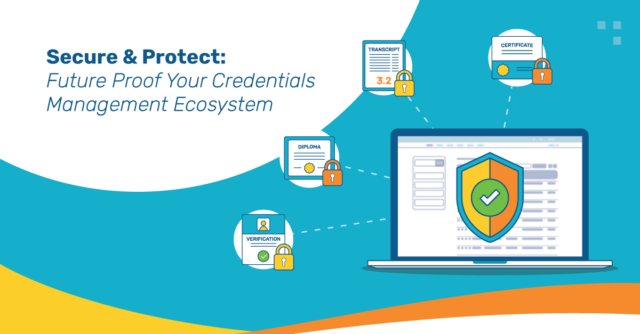
International
Secure & Protect: Future Proof Your Credentials Management Ecosystem

In today’s higher education landscape where more than a third of learners do not complete a four-year degree in 6 years, state systems and institutions are exploring new ways to support learners and help them achieve their academic goals. Many innovative state systems and institutions are turning to course sharing, a strategy where two or more institutions collaborate to make their courses available to each other’s students for credit at their home institution.
During a recent webinar, Mike Vogt, Director of Strategic Planning & Operations at California Virtual Campus, shared insights into their course-sharing initiative and provided tips to keep in mind when implementing your own initiative.
In California, the California Virtual Campus was created to unite the 116 colleges in the California Community College System into a single exchange, or platform, so that [learners] can seamlessly take classes at another institution without having to apply or matriculate. As Mike explains, “we are leveraging the power of our system to grow the opportunities for [learners] to complete their degree.”
Mike describes course sharing as a critical element in meeting learners where they are. “If you think about a student’s experience today within higher education, they are largely dependent on the institution they are applying to for everything. They rely on the institution to provide the courses in a specific modality. They rely on that college to schedule those courses that they need in the terms they need them…they need open seats.” Learners are entirely reliant on how well their institution can meet their individual needs.
At the same time, colleges are trying “to meet all those individual needs, for all of their [learners], who are all on very different pathways, at different entry points into these programs, and who come in at different times.” For both, it makes sense to leverage the power of the system-wide approach.
It can be very frustrating for learners if a course is not available when they need it, especially when their needs can be met somewhere else within the system. Course sharing removes a lot of the barriers that students run into when relying on one institution. According to Mike, “that is why [learners] were starting to swirl. They were starting to self-serve that access challenge they encountered with their local institution…We really saw that course sharing just opened up that access.”
Mike also shared helpful tips for those exploring a course-sharing initiative.
Course sharing inherently requires collaboration, so partnerships are essential to success. Mike strongly encourages leveraging system leadership when possible. “Finding partnerships within your system… is critical. We wouldn’t be here without the Chancellor’s Office. They have been with us every step of the way. They provide incredibly valuable insight and direction.” Mike also describes how they have helped overcome several challenges as a system along their journey.
In addition, leveraging existing or creating new consortial agreements can also remove obstacles. “Entering into course-sharing partnerships with consortiums has saved us time and time again.” From issues related to data sharing and FERPA to policy direction around financial aid, Mike explains, “if you can create a consortium or if you already have a consortium you can leverage, that is going to open up so many doors that you would have assumed are closed.”
Mike encourages others to explore course sharing. “I would just encourage people to try… when you actually enter into partnerships with your chancellors, with partners like Parchment, and with other systems that have already forayed out into this world, you’ll find that it is actually easier than you thought it would be. And, it is far more rewarding than you could have ever imagined.”
Take a deeper dive into California’s initiative, and learn how the United Negro College Fund and the University of Tennessee-Martin are also implementing course sharing to increase access and academic opportunity. Watch the full webinar below.
